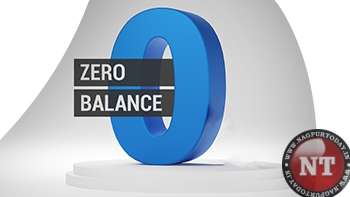
Opening a bank savings account is one of the first financial steps for most people. However, choosing the right one can seem complicated, with numerous options. Two of the most popular savings accounts are zero-balance accounts and regular savings accounts.
This blog breaks down the key differences to help you determine which suits your needs better.
What Is a Zero Balance Account?
As the name suggests, a zero-balance account is a savings account that does not demand you to maintain a minimum average monthly balance. Most banks in India offer this type of account with basic banking facilities.
Key Features:
- No minimum balance requirement
- Lower account maintenance charges
- Limited banking features – no chequebook, debit card, etc.
- Lower interest rate on savings – usually upto 4.5% per annum
- Limited transactions and caps on withdrawals
Additionally, many banks provide the option for zero balance account opening online, making it convenient to start saving without the need to visit a branch.
What Is a Regular Savings Account?
Regular savings accounts are standard savings bank accounts offered by all banks. They come bundled with various banking facilities and services. To avail of them, you must maintain an Average Monthly Balance (AMB), failing which you are penalised.
Key Features:
- Minimum AMB requirement (e.g. ₹1,000- ₹10,000)
- Banking facilities like cheque book, debit card, internet banking
- Higher interest rate on savings -up to 4.5% per annum
- Unlimited transactions at home branches and ATMs
- Overdraft facility available based on eligibility
For those who prefer the convenience of digital solutions, many banks also offer the option to Open Bank account Online, allowing you to manage your regular savings account without the need to visit a physical branch.
Key Differences Between Zero Balance and Regular Savings Accounts
The table below highlights the differences between a standard savings account and a zero-balance savings account.
| Feature | Zero Balance Account | Regular Savings Account |
| Minimum Balance | No minimum balance is required | Requires maintaining a minimum balance |
| Fees & Charges | Generally low or no maintenance fees | Penalty for not maintaining the minimum balance |
| Interest Rates | Often lower than regular savings accounts | Competitive rates often higher |
| Services Offered | Limited features (basic banking services) | Comprehensive features, including loans and investments |
| Eligibility | Open to all, ideal for low-income groups | Requires steady income and balance maintenance |
| Transaction Limits | May have restrictions on withdrawals | Higher withdrawal limits and privileges |
| Initial Deposit Amount | Zero-balance accounts generally do not require an initial deposit. If funding is required initially, it can be withdrawn immediately once the account becomes active. | A minimum deposit is typically needed to open an account |
| Overage Protection | Zero balance accounts usually do not offer any overdrafts or cash credit facilities | Regular savings bank customers can avail themselves of an overdraft by overdrawing their account up to a sanctioned limit and paying applicable interest charges. |
Zero Balance Account or Regular Savings Account – Which Option Works for You?
For most people, regular savings accounts make better sense, considering the higher interest earnings on deposits and the convenience of integrated banking facilities like chequebooks, debit cards, internet banking, etc.
However, zero-balance accounts can be helpful if you have limited or fluctuating income streams, making it challenging to maintain steady balances month-on-month. They also work if your transaction needs are low.
Here is a simple checklist to see which type suits your requirements best currently:
Consider Zero Balance Account If:
- Your income tends to vary each month
- Keeping a fixed minimum balance every month is challenging for you
- You only need to park some money or make a few transactions occasionally
- You don’t use bank facilities like cheques, cards, or net banking frequently
Look at Regular Savings Account If:
- Your inflows are fairly steady each month
- Banking facilities like cheques cards matter for transactions
- You do several withdrawals or transfers every month
- Earning some extra interest income on savings appeals to you
Conclusion
While interest rates are essential, facilities and charges also significantly affect the choice of savings account.
Assess your income stability, usage requirements, and banking needs first. This will help determine whether a zero-balance or regular savings account is a better option for you. However, you can always switch types as your financial situation evolves.














